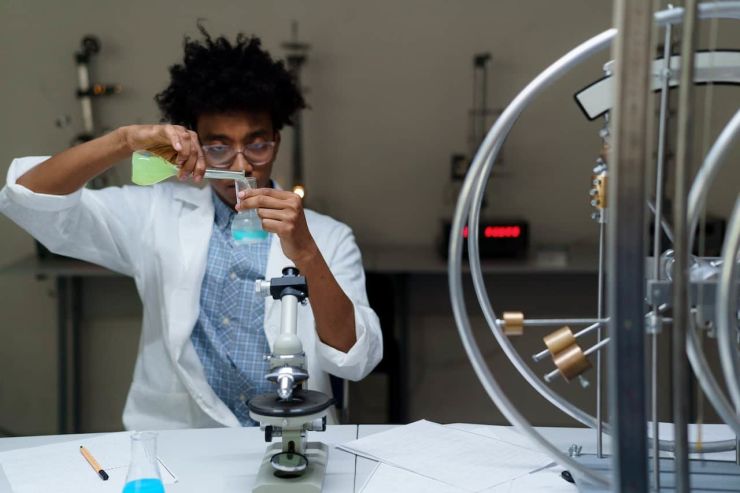Biochemistry is a field that brings together biology and chemistry to understand the tiny building blocks of life. If you’re curious about how living things work at the smallest levels, this might just be the right article for you.
Many students in Nigeria share this curiosity, which is why biochemistry is a popular course. If you’re starting fresh or want to advance your knowledge, we’ll look at more than 20 biochemistry courses in different universities across Nigeria.
We’ll also provide details about the universities, these biochemistry courses they offer, and the fees involved.
Table of contents
- What is Biochemistry all about as a Course?
- What can I Become if I Study Biochemistry?
- Is Biochemistry Hard?
- 20+ Biochemistry Courses in Nigeria
- 1. Molecular Biology
- 2. Metabolism
- 3. Enzyme
- 4. Biology
- 5. Biomolecules
- 6. General Chemistry
- 7. Organic Chemistry
- 8. Physiology
- 9. Biochemical engineering
- 10. Bioinformatics
- 11. Immunology
- 12. Medicinal chemistry
- 13. MSc Bioinformatics
- 14. Structure and Function of Molecules
- 15. Genetics
- 16. Membrane Biochemistry
- 17. Plant Biochemistry
- 18. Genetic Engineering
- 19. Industrial Biochemistry
- 20. Bioinorganic Chemistry
- 21. Advanced Enzymology
- What Subjects do you need to Study Biochemistry in Nigeria?
- Is Biochemistry a Lucrative Course?
- Is Biochemistry a Professional Course?
- Is Biochemistry a Medical Course?
- What type of Bachelor is Biochemistry?
- Best Universities to Study Biochemistry in Nigeria and their Fees
- Private Universities Offering Biochemistry in Nigeria
- How long does it take to Complete a Biochemistry Degree in Nigeria?
- FAQs on Biochemistry Courses
- Conclusion
- References
- Recommendations
What is Biochemistry all about as a Course?
Biochemistry is the study of the chemical processes and substances in living things. It blends biology and chemistry to understand how life works at a molecular level. In a biochemistry course, students learn in-depth about the molecular mechanisms that drive different biological functions and processes.
They gain the knowledge, and skills needed to understand how life operates on a tiny scale.
What are the Key Areas of Study in Biochemistry?
Bringing together biology and chemistry to explore how living things work at the molecular level. Key areas you’ll study include:
- Molecular Biology: Understanding how DNA and RNA are made and how proteins are created.
- Enzymology: Learning about enzymes and what they do in the body.
- Metabolism: Discovering how the body turns food into energy and how it manages these processes.
- Cell Biology: Looking at how cells are structured and how they function.
- Genetics: Studying how traits are passed down from one generation to the next.
- Structural Biology: Examining the shapes and structures of important biological molecules.
- Biotechnology: Using biochemistry to develop new products and technologies for medicine and industry.
- Pharmacology: Understanding how drugs work and how they affect the body.
- Immunology: Investigating how the immune system works and what happens when it goes wrong.
- Bioinformatics: Using computers to analyze and understand biological data.
See: The Best International Relations and Affairs Colleges 2024
What can I Become if I Study Biochemistry?
With a degree in biochemistry, you are open to various exciting career options, including:
- Research Scientist: You might work in a lab at a university, government agency, or company, where you’ll conduct experiments and explore new scientific ideas.
- Clinical Biochemist: In this role, you’ll be in medical labs, analyzing samples from patients to help diagnose illnesses.
- Pharmaceutical Scientist: Here, you’ll be involved in creating and testing new medicines to treat different health conditions.
- Forensic Scientist: You’ll use biochemical techniques to help solve crimes by analyzing evidence.
- Biotechnologist: This job involves developing new products and technologies using biological processes, which can be used in various industries.
- Environmental Consultant: You’ll work on solving environmental problems, like pollution, by using biochemical methods to understand and address these issues.
Is Biochemistry Hard?
Biochemistry can be tough because it combines both biology and chemistry, so you need to understand both subjects well. The classes cover complicated ideas, include a lot of lab work, and require you to think critically.
However, with hard work, passion, and good study habits, many students find it manageable and very rewarding.
See Also: The 10 Easiest University Degrees in the UK | 2024 Rankings
20+ Biochemistry Courses in Nigeria
The following are Biochemistry courses you can find in Nigerian schools
- Molecular biology
- Metabolism
- Enzyme
- Biology
- Biomolecules
- General chemistry
- Organic chemistry
- Physiology
- Biochemical Engineering
- Bioinformatics
- Immunology
- Medicinal Chemistry
- MSc Bioinformatics
- Structure and function of molecules
- Genetics
- Membrane Biochemistry
- Plant Biochemistry
- Genetic Engineering
- Industrial Biochemistry
- Bioinorganic Chemistry
- Advanced Enzymology
1. Molecular Biology
In this course, you’ll learn about gene expression, genetic engineering, molecular genetics, and biotechnology. You’ll understand how genes are regulated and how genetic information is passed on. Not leaving out how molecules make up living things, like DNA, RNA, and proteins.
You’ll also get to use molecular techniques in labs, which can be applied in research and medicine. This mix of practical and theoretical learning prepares you for jobs in research, healthcare, and biotechnology.
2. Metabolism
Metabolism is a key part of biochemistry course that looks at how living things carry out the chemical reactions needed to stay alive. In this course, students learn about different metabolic pathways, like glycolysis and the citric acid cycle, and how these processes are controlled.
The course also covers how enzymes help in metabolism, how the body produces energy, and the effects of metabolic disorders on health. Understanding metabolism is crucial for careers in medicine, nutrition, and biotechnology.
3. Enzyme
This biochemistry course walks you through enzyme behavior, which are proteins that help speed up chemical reactions in our bodies. You’ll learn about their structure, how they work, and their important role in different biological processes.
The course covers how enzymes do their job, how they’re controlled, and their uses in fields like medicine and biotechnology. By studying enzymes, you’ll understand how life functions at a tiny level and how these small helpers can be used to make progress in health and technology.
4. Biology
Next on our list of biochemistry courses is this course which explores different parts of life, from tiny microorganisms to big animals and plants. You’ll learn about how living things are built, how they function, grow, where they come from, how they evolve, and where they are found.
5. Biomolecules
In this course, you’ll learn about important biomolecules like proteins, nucleic acids, carbohydrates, and lipids, focusing on their structure, function, and how they interact with each other.
You’ll explore topics such as how enzymes work, how DNA is copied, and the crucial roles these molecules play in the processes that keep cells alive.
6. General Chemistry
General Chemistry is a fundamental course that lays the groundwork for understanding chemistry. It starts with the basics, teaching you about matter, its properties, and how it changes.
In this course, you’ll encounter topics like atomic structure, chemical bonds, and reactions. You’ll also learn how to balance equations and explore the rules that govern chemical processes.
7. Organic Chemistry
Organic chemistry looks at carbon-based compounds and how they react. In this course, you’ll learn about the shapes and properties of these molecules and how they’re made. It’s crucial for understanding how different biochemical processes work.
8. Physiology
Physiology is another course on our list of biochemistry courses. It looks at how living things work, from the smallest cells to the whole organs. This course explores the different systems in the body, showing how they function and work together to keep us healthy and balanced.
9. Biochemical engineering
Biochemical engineering blends chemistry, biology, and engineering to create processes that produce biological products.
In this course, you’ll learn how to design and improve systems for making things like medicines and other bioproducts.
10. Bioinformatics
Bioinformatics is all about using computer tools to handle and study biological data. In this course, you’ll learn how to work with complicated information like gene sequences and protein structures to better understand how living things function.
11. Immunology
This course looks at how the body’s defense system fights off germs, the roles of different immune cells, and how the body identifies and responds to harmful invaders.
See: The Best International Relations and Affairs Colleges 2024
12. Medicinal chemistry
Medicinal chemistry is all about creating and improving new medicines. In this course, you’ll learn how different chemicals work as drugs and how they affect the body. It’s like figuring out the best recipe for making medicines that can help treat various health conditions.
13. MSc Bioinformatics
The MSc in Bioinformatics is a specialized program for graduates that teaches advanced skills in handling and analyzing biological data with computer tools. It gets students ready for careers or research roles in areas like genomics, proteomics, and other related fields.
14. Structure and Function of Molecules
This course looks at the shapes and roles of important biological molecules like proteins, nucleic acids, and lipids. By understanding how these molecules are structured, you can better see how they interact and perform crucial functions in living things.
15. Genetics
Genetics is all about understanding how traits are passed from one generation to the next. This course looks at how genes work, how traits are inherited, and the molecular details that explain why we have certain characteristics or genetic conditions.
16. Membrane Biochemistry
Membrane biochemistry looks at how biological membranes are built and how they work. This course explores how these membranes control what goes in and out of cells and their role in various cellular activities.
17. Plant Biochemistry
Plant biochemistry is another biochemistry course that looks into the chemical activities that happen inside plants.
This course covers how plants make their food through photosynthesis, how they manage their internal processes, and how plant chemicals help them grow and protect themselves.
18. Genetic Engineering
Genetic engineering is all about changing an organism’s DNA to give it new traits. This course covers how to modify genes, create genetically modified organisms, and use these techniques in medicine, farming, and research.
19. Industrial Biochemistry
Industrial biochemistry applies the concepts of biochemistry to real-world manufacturing. This course looks at how we use biological systems to make products like biochemicals and biofuels. It focuses on how these processes work in an industrial setting.
20. Bioinorganic Chemistry
Bioinorganic chemistry explores how metals play a part in living organisms. This course focuses on understanding how metal ions affect enzyme function, help with electron transfers, and contribute to various biochemical processes in the body.
21. Advanced Enzymology
This course looks at how enzymes speed up chemical reactions, how they are regulated, and how they are used in biotechnology and medicine.
What Subjects do you need to Study Biochemistry in Nigeria?
To pursue a degree in biochemistry, there is the need for you to have a strong background in science. The following subjects should be your strengths during your secondary school education. Also, if you do well in these subjects, your admission to study biochemistry in the higher institution is guaranteed.
- Biology
- Chemistry
- Physics
- Mathematics
- English Language
Is Biochemistry a Lucrative Course?
Biochemistry can be a good career choice. Graduates can get jobs in many areas like drug companies, healthcare, biotech firms, farming, and environmental science. There’s a growing need for biochemists, and with more experience and higher degrees, they can earn even better salaries.
Also, read: What are Honors Courses? How it Works & Requirements in 2024
Is Biochemistry a Professional Course?
The term ‘professional course usually means programs that prepare students for specific careers focusing on practical skills and job readiness. While biochemistry might not always be seen as a professional course in the usual sense, it does have several aspects that make it quite professional and can lead to unique career paths.
However, the following are what passes biochemistry as a professional course:
- Biochemistry programs involve a lot of lab work and practical training. Students learn important techniques for research, diagnostics, and various industrial uses.
- Biochemistry graduates are ready for careers in many fields like healthcare, pharmaceuticals, biotechnology, environmental science, and academic research.
- Students can focus on specific areas like clinical biochemistry, molecular biology, biotechnology, and pharmacology, tailoring their education to their career goals.
- Biochemistry programs teach students important skills such as analytical thinking, problem-solving, data analysis, and scientific communication. These skills are highly valued in many professional settings.
Is Biochemistry a Medical Course?
Biochemistry isn’t exactly a medical course, but it has a strong connection to the medical field. It involves studying the chemical processes and substances that occur within living organisms, covering a wide range of topics like molecular biology, genetics, enzymology, metabolism, and cell biology.
Many medical courses and careers require a solid grasp of biochemistry. For example, medical students often study biochemistry in their early years to understand the molecular basis of health and disease. This foundational knowledge is crucial for their future studies and professional practice.
Biochemists also play a significant role in medical research. They explore the biochemical pathways involved in various diseases, which can lead to the development of new treatments and therapies. Their work is essential for advancing our understanding of health and illness.
Clinical biochemistry is a specialized area where biochemists focus on analyzing bodily fluids for diagnostic purposes. Clinical biochemists work in medical labs to help diagnose and monitor diseases, providing critical information for patient care.
In pharmacology, biochemists study how drugs interact with biological systems. This knowledge is vital for developing new medications and improving existing ones. Their work ensures that drugs are safe and effective for treating various conditions.
What type of Bachelor is Biochemistry?
Biochemistry is usually available as a Bachelor of Science (B.Sc.) degree. This course blends classroom learning with hands-on lab work, getting students ready for many science-related jobs.
Best Universities to Study Biochemistry in Nigeria and their Fees
The best universities to study biochemistry in Nigeria include:
1. University of Lagos
The University of Lagos stands out for its academic excellence. Students here can study biochemistry at both undergraduate and postgraduate levels, ensuring a comprehensive education that caters to different educational and professional development stages.
The university prides itself on its dedicated team of faculty members, who are experienced experts in various areas of biochemistry. Their expertise and commitment to teaching play a crucial role in guiding students through their academic journey.
Besides top-notch instruction, the University of Lagos offers excellent facilities and resources. Students have access to modern laboratories, research centres, and libraries, all equipped with the latest technology.
The school fees per academic session for this course at UNILAG costs ₦176,300.
2. University of Nigeria, Nsukka
Severally, the University of Nigeria, Nsukka has ranked tops amongst Nigerian schools and for biochemistry, it offers a wide range of biochemistry programs, catering to both undergraduate and postgraduate students.
The biochemistry department at UNN boasts a team of experienced and respected faculty members. These dedicated educators bring a wealth of knowledge and expertise to the classroom, helping students to gain valuable insights and a deeper understanding of the subject.
The university’s modern laboratories and research centers provide students with the tools and resources to conduct experiments and engage in innovative research. You can expect to pay the sum of ₦72,200 as your school fees per session.
Related: List of Public Administration Courses in Nigeria | Universities and Requirements
3. Ahmadu Bello University
The undergraduate program, a Bachelor of Biochemistry, is one of the oldest in Nigeria, focusing on teaching and research in biochemistry and applied biochemistry, ensuring students gain a thorough understanding and practical experience in these areas.
The university has top-notch facilities, including modern laboratories and research institutes, to support students’ biochemistry studies. Currently, the biochemistry school fees at ABU, Zaria is at ₦84,500. If you are planning to study at Ahmadu Bello University, it is nice you get the adequate support financially.
4. University of Ibadan
The University of Ibadan is often seen as Nigeria’s top university and is consistently ranked among the best in the country.
Students interested in biochemistry at this university can choose from undergraduate and postgraduate programs. This flexibility allows students to pursue their passion for biochemistry at different academic levels.
The University of Ibadan offers modern laboratories, cutting-edge research facilities, and well-stocked libraries to support biochemistry studies. These resources ensure students have everything they need to succeed in their studies and research projects.
At the undergraduate level, you can expect to pay ₦45,500 per session and ₦99,500 at the postgraduate level.
5. Obafemi Awolowo University
Established in 1948, the University of Ibadan, UI as it is fondly referred to, is the first University in Nigeria and the Department of Biochemistry and Molecular Biology at Obafemi Awolowo University (OAU), Ile-Ife, fosters a vibrant academic environment that combines strong teaching with advanced research.
The goal is to prepare students to compete globally, equipping them with innovative thinking to tackle important issues in organic chemistry. With a comprehensive education in biochemistry, you can be assured of covering all the essentials up to the bachelor’s degree level. You can expect to pay the sum of ₦79,000.
Private Universities Offering Biochemistry in Nigeria
Private universities offering biochemistry courses include:
- Covenant University
- Afe Babalola University
- Babcock University
- Bells University of Technology
- American University of Nigeria
How long does it take to Complete a Biochemistry Degree in Nigeria?
In Nigeria, a biochemistry degree usually takes about four years to finish. However, this time might vary a bit depending on the university and whether there are extra requirements like internships or research projects.
See: University Of Ibadan (UI) JAMB cut-off mark for all courses | 2024
FAQs on Biochemistry Courses
According to Bureau of Labor Statistics, the job outlook of biochemists is projected to grow 7 percent from 2022 to 2032, faster than the average for all occupations.
Yes, you can pursue master’s and doctoral degrees in biochemistry.
Many programs include industrial training or internships to provide practical experience.
Yes, if your current program includes relevant coursework, you might be eligible to transfer to nursing. Check the admission requirements of the nursing program you’re have interest in to see if your courses align.
Conclusion
Biochemistry is an exciting and valuable field with lots of opportunities. If you’re interested in research, healthcare, or biotechnology, studying biochemistry can lead to many and rewarding careers.
This guide to biochemistry courses in Nigeria should help you understand your options and make a smart choice about your education.
References
- Professions.ng – Biochemistry: Key Universities in Nigeria
- Edurank.org – Biochemistry in Nigeria
- Nigerianscholars.com – List of Universities that Offer Biochemistry






